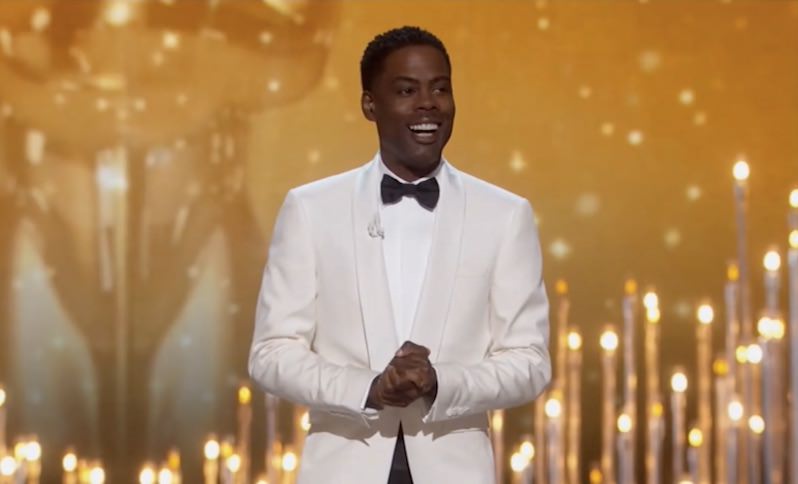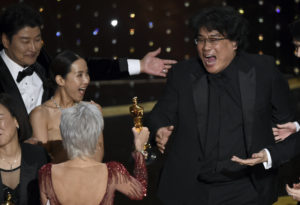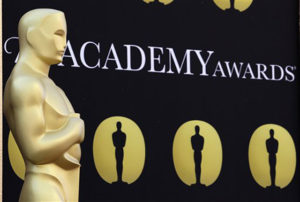Live-Blog: Oscars 2016: In the Midst of Controversy, the Show Goes On (Updated)
Update: In the show's home stretch, the political moments seemed to happen with about the same frequency that African-Americans were called onto the Oscar stage as presenters Also: Joe's standing O, DiCaprio's climate-change plea and the 88th Oscars' final wins. abc.go.com
abc.go.com
Update: 9:45 p.m. PST: In the show’s final stretch, the political moments seemed to happen with about the same frequency as African-Americans were called onto the Oscar stage … as presenters. Louis Gossett Jr., Quincy Jones, Whoopi Goldberg, Pharrell Williams, Abraham Attah and Morgan Freeman represented something missing from too many categories Sunday evening, not to mention Hollywood writ large.
If it isn’t clear by now what that might be, here’s a refresher, from one of host Chris Rock’s most controversial riffs from the broadcast:
Why are we protesting this Oscars? It’s the 88th Academy Awards, which means this ‘no black nominees’ thing happened at least 71 other times. You got to figure that it happened in the ’50s, in the ’60s. One of those years, Sidney [Poitier] didn’t put out a movie. I’m sure there were no black nominees some of those years, say ’62 or ’63. Black people did not protest. Why? Because we had real things to protest at the time. We were too busy being raped and lynched to care about who won best cinematography. When your grandmother’s swinging from a tree, it’s really hard to care about best documentary foreign short.
Entertainment Weekly pointed out after the fact that his joke didn’t land so well with everyone.
Any greatest-hits compendium of moments when the Dolby Theatre’s decked-out stage became a platform for political expression has to include “Spectre” singer and co-songwriter Sam Smith’s dedication of his best original song victory to the global LGBT community. “I stand here tonight as a proud gay man, and I hope we can all stand together as equals one day,” Smith said. (To clarify Smith’s onstage reference, it’s worth noting that Ian McKellen recently wondered why no openly gay man has ever won the best actor Oscar).
Two foreign films—Hungary’s “Son of Saul” (which took gold in the best foreign film category) and Pakistan’s “A Girl in the River: The Price of Forgiveness” (best short subject documentary)—zoomed in on forms of religious persecution. Vice President Joe Biden won a standing ovation by showing up to call for an end to sexual violence and to introduce Lady Gaga’s performance of “Til It Happens to You,” from the campus rape documentary “The Hunting Ground.“
Finally, the night’s biggest awards went to Alejandro Iñárritu, who bagged the best director Oscar for the second consecutive year, for his work on the grueling frontier thriller “The Revenant”; his star, Leonardo DiCaprio, as best actor; Brie Larson of “Room,” another cinematic confrontation with abuse, for best actress; and “Spotlight,” the tale of journalistic triumph, which was named best feature.
Iñárritu pointed out how the moment, along with his film, offered “a great opportunity for our generation to really liberate ourselves from all prejudice and … this tribal thinking.” DiCaprio, for whom his sixth nomination was evidently the charm, gestured at his own cause célèbre: global warming. “Climate change is the most urgent threat facing our entire species,” he intoned, warning, “we need to stop procrastinating.”
Rock grabbed the microphone for one last bid to make the 88th Academy Awards extravaganza a little less white, issuing a mass invitation to this summer’s BET Awards. His signoff? “Black Lives Matter!”
And scene.
—Posted by Kasia Anderson * * *
Update: 7:37 p.m. PST: Politics continued to pop as the initial statuettes were passed out at the Oscars —“otherwise known as the White People’s Choice Awards,” as Rock joked—in the telecast’s special features, in Rock’s running commentary and in the awards themselves.
Rock built on his one-two punch of an opener with more zingers, and the show’s creators ran with the race-based humor in slick and funny gag reels. One prefabricated clip recast African-American actors in title film roles or invented supporting roles not actually included in the originals. Whoopi Goldberg—herself a best actress winner for 1990’s supernatural romance “Ghost”—schooled Jennifer Lawrence’s domestic entrepreneur from “Joy.” “A black girl would have to invent the cure to cancer before they even give her a TV movie!” Goldberg cracked. Tracy Morgan stepped into Eddie Redmayne’s shoes in “The Danish Girl”—complete with a Danish pastry. Rock himself beamed in from Mars in lieu of “The Martian” star and Oscar nominee Matt Damon, asking to be brought home, but Kristen Wiig and Jeff Daniels decided “Black Astronaut” wasn’t worth the trouble or expense.
The Oscar producers’ decision to trot out actor-turned-Fox-News commentator Stacey Dash, who wished the crowd a “happy Black History Month,” was met with apparent confusion within the Dolby Theatre and a silent reaction from The Weeknd, one of the evening’s musical performers, that spoke volumes.
Swedish actor Alicia Vikander, who won accolades in two memorable roles last year—as a technological creation made by and for men in “Ex Machina” (see Carrie Rickey’s review of that film here) and as the wife of transgender painter Lili Elbe in “The Danish Girl”—won the best supporting actress Oscar for the latter picture. “The Revenant” cinematographer Emmanuel Lubezki raised the bar with his record-breaking third consecutive win, for “The Revenant,” following his win for “Birdman” last year and “Gravity” two years ago.
“Spotlight,” director Tom McCarthy’s spot-on portrayal of the dogged Boston Globe reporting team that exposed the Catholic Church’s incalculable abuses of children and power over decades in Boston and beyond, met prognosticators’ expectations with a best original screenplay win. Globe scribe Mike Rezendes, played by best supporting actor nominee Mark Ruffalo in “Spotlight,” made a thumbs-up cameo after a shoutout from Rock.
“Mad Max: Fury Road,” director George Miller’s frenetic, apocalyptic big-screen nightmare shot through with ecological and feminist themes had, by press time, racked up six wins, sweeping technical categories such as sound mixing, sound editing, and makeup and hairstyling. In her acceptance speech, “Mad Max” costume designer and newly minted Academy Award-winner Jenny Beavan was played off the stage as she tried to talk about the movie’s politics.
The Weeknd later made the ceremony not quite #SoWhite as he took the stage to sing “Earned It” from a film with seriously questionable feminist credentials: “Fifty Shades of Grey.”
The biggest upset of the evening happened as the midpoint approached, when Mark Rylance won best supporting actor for his role as a standup secret agent in Steven Spielberg’s Cold War brow-knitter “Bridge of Spies.” Cue the boxing metaphors as Sylvester Stallone once again missed his chance to go home with a little gold sidekick for “Creed.”
We’d like to thank the Academy for keeping an updated list of Oscar winners on its website.
—Posted by Kasia Anderson * * *
Update: 6:22 p.m. PST: In his host gig at the Academy Awards, Chris Rock, comedian, actor and filmmaker, was in a hard place. This is the second consecutive year not one actor of color was nominated, a situation dubbed #OscarsSoWhite. Many prominent African-American actors and filmmakers—among them Will and Jada Pinkett Smith, Ryan Coogler, Ava DuVernay and Spike Lee—elected not to come. Rock’s job was to comically criticize the academy he represented.
Rock strolled out onstage after a montage of 2016 films. ”I counted at least 15 black people in that montage,” he joked.
“Why are we protesting this Oscars?” he asked. “What happened this year? Everybody got mad. … Jada [Pinkett Smith] boycotting Oscars is like me boycotting Rihanna’s panties. … I wasn’t invited.” Then he winked and said, “This year’s ‘In Memoriam’ … it’s just gonna be black people that were shot by cops on their way to the movies.”
Rock did it. He criticized Hollywood’s racism by deflecting criticism of the academy. And it was the best, most politically pointed monologue in maybe forever.
—Posted by Carrie Rickey * * *
The votes are in. The predictions are in. And in some people’s estimation, the fix is in.
Once again, members of the Academy of Motion Picture Arts and Sciences are in hot water for inspiring the #OscarsSoWhite online campaign by nominating an overwhelmingly Caucasian lineup of Oscar contenders. Hollywood’s systemic exclusion issues will affect the Academy Awards telecast’s ratings, as some 20 percent fewer African-American viewers will reportedly be watching this year.
But big money rides on the Oscars, so the show must go on—and as of Sunday evening, it went live on ABC.
Academy President Cheryl Boone Isaacs turned up on the red carpet for an interview with the network’s Robin Roberts. Skipping the usual chatter about designer dresses and shoes, Isaacs discussed her organization’s persistent problems with race and representation. She said that the academy has been “focused on more inclusion” within its ranks of about 7,000 members from all parts of the industry, who are obliged to serve as “ambassadors out into the entire motion picture industry and to make sure the conversation continues and that action is taken.”
Isaacs also claimed that the present push for diversification wasn’t just a response to #OscarsSoWhite or to the boycott of Sunday’s event by prominent African-American actors and directors such as Coogler and DuVernay. “We had been having these discussions and pulling together some initiatives for a while, for a few years now,” she said. “We are going to continue to take action and not just talk.”
Coogler and DuVernay will be focusing their energies on a different national quandary that is also heavily racially inflected (per the Los Angeles Times):
“Creed” director Ryan Coogler and “Selma” director Ava DuVernay will be in Flint, Mich., for a benefit aimed at supporting that city’s beleaguered residents as they suffer through an ongoing water crisis. Celebrities including singers Janelle Monae and Ledisi, actor Jesse Williams and comedian Hannibal Buress will also attend the event put on by Coogler’s artist-activist collective Blackout for Human Rights.
Though the event is happening on the same day as the Oscars, Coogler told Buzzfeed that the timing was merely coincidental. He said the date was chosen because it’s the final weekend of Black History Month.
The Times piece quoted above is packed with information about other ways activists from the entertainment community and beyond are protesting, organizing and calling for change in the business of show business.
Meanwhile, Truthdig contributor, industry expert and film reviewer Carrie Rickey and Truthdig Senior Editor Kasia Anderson live-blog all evening, right here on this page. Also check out Truthdig’s Twitter feed for tweets from Rickey and our staff. We’ll also post Rickey’s post-show wrapup following the conclusion of the telecast Sunday evening. Stay tuned.
—Posted by Kasia Anderson
Your support matters…Independent journalism is under threat and overshadowed by heavily funded mainstream media.
You can help level the playing field. Become a member.
Your tax-deductible contribution keeps us digging beneath the headlines to give you thought-provoking, investigative reporting and analysis that unearths what's really happening- without compromise.
Give today to support our courageous, independent journalists.






You need to be a supporter to comment.
There are currently no responses to this article.
Be the first to respond.